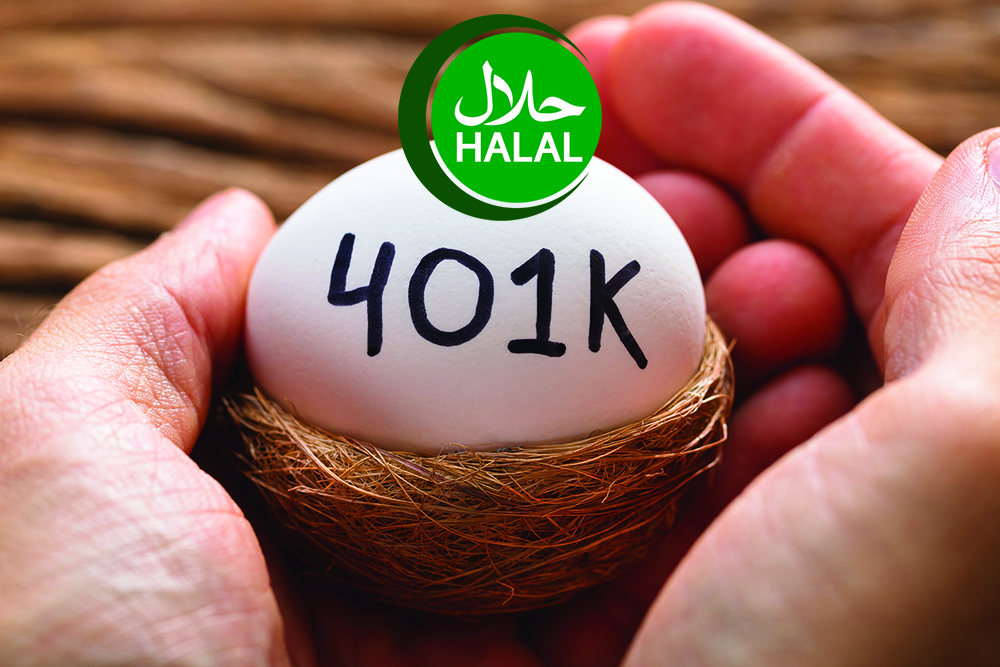How to lobby your company for a retirement plan that meets Islamic guidelines

By Amal Omer
March/April 2022
As we all know, purity is a key aspect of our Islamic faith. This is not just limited to the foods we consume or personal hygiene. Purity also extends to our earnings, the source of our income, and how we invest.
Financial institutions like Azzad Asset Management and Saturna Capital offer halal investment options that screen out companies that profit from alcohol, tobacco, pornography, gambling, insurance, interest and firearms. This screening also avoids investing in conventional bonds that generate income from interest (riba) and companies with high-debt ratios.
For many of us, living in a non-Muslim society requires being diligent to ensure that we consider Islamic guidelines in all aspects of our lives. One area that can often be overlooked is our employer retirement savings plans, such as a 401k or 403b.
Typically, these plans offer limited investment options that are not halal, as they invest in the aforementioned companies or bonds. If a halal investment option is not available at your company, there are steps you can take to ask for an accommodation.
In working to help your employer, typically the organization’s human resources department, understand your request for halal-compliant investment options, it can be explained as ethical or socially responsible investing that meets Islamic guidelines. While socially responsible funds may screen out impermissible lines of business, only halal funds will screen for financial ratios and interest.
You can also contact your company’s 401k provider to see if they offer halal funds or a self-directed option and share this in your communication with your human resources department. If the option is available, this helps spell out the solution for your employer: adding the halal funds or self-directed option to their benefit offering.
“Oftentimes employers are not aware that their employees have religious and ethical investment requirements,” said Fatima Iqbal, CFP®, senior investment strategist and financial planner at Azzad Asset Management. “We always recommend requesting a self-directed option that allows them to have a brokerage account through their retirement plan. They can then purchase halal mutual funds or have us manage the account for them as their fiduciary.”
Iqbal also advised grouping with other Muslim colleagues to lobby for the option to be made available. It can be helpful for employers to see that there is a demand for a halal-compliant 401k within the organization.
She added that “choosing not to participate [in the 401k] can mean losing out on tax-advantaged retirement savings and potential employer matching contributions.”
It’s important to note for your employer that not having a halal-compliant option available means that you are unable to participate in the company’s 401k and therefore aren’t being provided access to the benefits offered to the other employees. You can also review your organization’s equal employment opportunity (EEO) policy, which may advise you to apply for an accommodation to access benefits based on your religious beliefs.
According to laws enforced by the U.S. Equal Employment Opportunity Commission, it is illegal for employers to discriminate against employees because of their religion. Although employers are not in violation of the Department of Labor laws if they do not meet employees’ ethical requirements, it’s in their best interest and their EEO policy that they accommodate equal access to the benefits offered.
And, as companies look to enhance their diversity, equity and inclusion (DEI) practices, you can highlight that offering such a plan is an asset that can help retain and attract talent. Raising the need for inclusive benefits can also help organizations better understand the role of faith as they establish DEI offices.
While Muslims are encouraged to be unobtrusive about their good deeds, living in non-Muslim societies, where we often navigate unique situations like this, God willing, it can be a sadaqa to share with others how you have pursued an accommodation in this matter or in other affairs, to abstain from the unlawful and attain the lawful. God tells us, “If you disclose your sadaqaat (charity), it is well; but if you conceal them and give them to the poor, that is better for you” (2:271) and “Those who spend their money in the night and in the day, secretly and openly, they will have their reward with their Lord. There is no fear over them, nor will they grieve” (2:274).
Creating awareness about the need for halal investment options could also develop an incentive for financial institutions to offer such plans and for companies to include them in their benefit packages. As Muslims, we must uphold our values in all aspects of our lives, including our finances. When we take the initiative to practice our faith with the best of intentions, we can strengthen our iman, bring baraka to our wealth and make the path easier for the future-generation of Muslims.
Amal Omer is a freelance writer based in the Washington, D.C., area.
What did you think about this article? Send comments and story pitches to horizons@isna.net. Islamic Horizons does not publish unsolicited material.